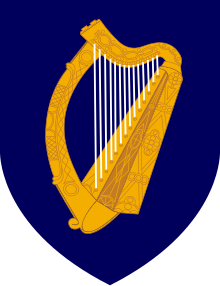Seo dhíbh, a chairde, duan Ógláigh
Caithréimeach bríomhar ceolmhar
Ár dtinte cnámh go buacach táid
'S an spéir go mín réaltógach
Is fonnmhar faobhrach sinn chun gleo
'S go tiúnmhar glé roimh thíocht don ló
Fé chiúnas chaomh na hoíche ar seol
Seo libh, canaídh Amhrán na bhFiann.
Curfá:
Sinne Fianna Fáil,
atá faoi gheall ag Éirinn,
Buíon dár slua
thar toinn do ráinig chugainn,
Faoi mhóid bheith saor
Seantír ár sinsear feasta,
Ní fhágfar faoin tíorán ná faoin tráill.
Anocht a théam sa bhearna bhaoil,
Le gean ar Ghaeil, chun báis nó saoil,
Le gunna-scréach faoi lámhach na bpiléar,
Seo libh canaig' amhrán na bhFiann.
Cois bánta réidhe, ar ardaibh sléibhe
Ba bhuadhach ár sinsir romhainn
Ag lámhach go tréan fén sárbhrat séin
'Tá thuas sa ghaoth go seolta
Ba dhúchas riamh dár gcine cháidh
Gan iompáil siar ó imirt áir
'S ag siúl mar iad i gcoinne námhad
Seo libh, canaídh Amhrán na bhFiann
Curfá
A bhuíon nach fann d'fhuil Ghaeil is Gall
Sin breacadh lae na saoirse
Tá sceimhle 's scanradh i gcroíthe námhad
Roimh ranna laochra ár dtíre
Ár dtinte is tréith gan spréach anois
Sin luisne ghlé sa spéir anoir
'S an bíobha i raon na bpiléar agaibh
Seo libh, canaídh Amhrán na bhFiann
Curfá[3] | [ʃɔ ʝiːvʲ ə xɑːɾˠ.dʲə dˠuənˠ oːg.lˠɑːɣ]
[kɑːh.ɾʲeː.mʲɑːx bʲɾʲiː.w̃əɾˠ coːlˠ.w̃əɾˠ]
[ɑːɾˠ dʲinʲ.tʲə knˠɑːw̃ gə bˠuə.kɑːx tˠɑːdʲ]
[ʔsˠ ənˠ ʃpʲeːɾʲ gə mʲiːnʲ ɾʲeːlˠ.tˠoː.gəx]
[iʃ fˠɔnˠ.w̃ɑːɾˠ fˠiːw.ɾˠəx ʃinʲ xʊnˠ ɟlʲoː]
[ʔsˠ gə tʲuːnˠ.w̃əɾˠ ɟlʲeː ɾˠɪṽʲ hiːxtˠ dˠɔnˠ lˠoː]
[fʲeː çuː.nˠəsˠ xiːw̃ nˠə hiː.çə əɾˠ ʃoːlˠ]
[ʃɔ lʲɪvʲ kɑ.nˠɪɟ əu.ɾˠaːnˠ nˠə vʲi(ə)nˠ]
[kʊɾˠ.fˠɑː]
[ʃɪ.nʲə fʲi(ə).nˠə fˠɑːlʲ]
[ə.tˠɑː fˠiː jalˠ ɛɟ eː.ɾʲənʲ]
[bˠiːnˠ dˠɑːɾˠ sˠl̪ˠu(ə)]
[haɾˠ tˠiːnʲ dˠɔ ɾˠɑː.nʲɪɟ xuː(.gə)nʲ]
[fˠiː vˠoːdʲ vʲɛ sˠeːɾˠ]
[ʃanˠ.tʲiːɾʲ ɑːɾˠ ʃiːnʲ.ʃəɾˠ fʲasˠ.tˠə]
[nʲiː ɑːk.(f)ˠəɾˠ fˠiːnʲ tʲiː.ɾˠɑːnˠ nˠɑː fˠiːnʲ tˠɾˠɑːlʲ]
[ə.nˠɔxtˠ ə heːmˠ sˠə vʲɑːɾˠ.nˠə vˠiːlʲ]
[lʲɛ ɟanˠ ɛɾʲ ɣeːlʲ xʊnˠ bˠɑːʃ nˠoː sˠeːlʲ]
[lʲɛ ɡʊ.nˠə ʃcɾʲeːx fˠiː lˠɑː.wəx nˠə bʲi.lʲeːɾˠ]
[ʃɔ lʲɪvʲ kɑ.nˠɪɟ əu.ɾˠaːnˠ nˠə vʲi(ə)nˠ]
[kɔʃ bˠɑːnˠ.tˠə ɾʲeː.ʝə əɾˠ əɾˠ.dˠɑːw ʃlʲeː.vʲə]
[bˠə wuə.ɣɑːx ɑːɾˠ ʃinʲ.ʃiɾʲ ɾʲʊ.w̃ɑːnʲ]
[əg lˠɑː.w̃əx gə t͡rʲeːnˠ fʲeːnʲ sˠɑːɾˠ.wɾˠətˠ ʃeːnʲ]
[ʔtˠɑː huəsˠ sˠə ɣiːh gə ʃoːlˠ.tˠə]
[bˠə ɣuː.xəsˠ ɾʲiəw̃ dˠɑːɾˠ ɟi.nʲə xɑːʝ]
[gənˠ ʊmˠ.pˠɑːlʲ ʃiəɾˠ oː i.mʲiɾʲtʲ ɑːɾʲ]
[ʔsˠ əg ʃuːlˠ məɾˠ jədˠ i giː.nʲə nˠɑː.w̃ədˠ]
[ʃɔ lʲɪvʲ kɑ.nˠɪɟ əu.ɾˠaːnˠ nˠə vʲi(ə)nˠ]
[kʊɾˠ.fˠɑː]
[ə wiːnˠ nˠəx fˠənˠ d̩ˠʔᵝiːlʲ ɣeːlʲ iʃ gəlˠ]
[ʃinʲ bʲɾʲɑː.kəɣ lˠeː nˠə sˠiːɾʲ.ʃə]
[tˠɑː ʃcɪṽʲ.lʲə ʔsˠ sˠkɑnˠ.ɾˠɑɣ i gɾˠiː.hə nɑː.w̃ədˠ]
[ɾˠɪṽʲ ɾˠə.nˠə lˠiːx.ɾˠə ɑːɾˠ dʲiː.ɾʲə]
[ɑːɾˠ dʲinʲ.tʲə iʃ t͡rʲeːh gənˠ ʃpʲɾʲeːx ə.nˠɔʃ]
[ʃinʲ lˠɪʃ.nʲə ʝlʲeː sˠə ʃpʲeːɾʲ ənˠɔʃ]
[ʔsˠ ənˠ bʲiː.wə i ɾˠiːnˠ nˠə bʲi.lʲeːrˠ ə.gɑːvʲ]
[ʃɔ lʲɪvʲ kɑ.nˠɪɟ əu.ɾˠaːnˠ nˠə vʲi(ə)nˠ]
[kʊɾˠ.fˠɑː] | We'll sing a song, a soldier's song
With cheering, rousing chorus
As round our blazing fires we throng
The starry heavens o'er us
Impatient for the coming fight
And as we wait the morning's light
Here in the silence of the night
We'll chant a soldier's song
Chorus:
Soldiers are we,
whose lives are pledged to Ireland,
Some have come
from a land beyond the wave,
Sworn to be free,
no more our ancient sireland,
Shall shelter the despot or the slave.
Tonight we man the "bearna bhaoil",
In Erin's cause, come woe or weal,
'Mid cannons' roar and rifles' peal,
We'll chant a soldier's song.
In valley green, or towering crag
Our fathers fought before us
And conquered 'neath the same old flag
That's proudly floating o'er us
We're children of a fighting race
That never yet has known disgrace
And as we march, the foe to face
We'll chant a soldier's song
Chorus
Sons of the Gael! Men of the Pale!
The long-watched day is breaking
The serried ranks of Innisfail
Shall set the tyrant quaking
Our camp fires now are burning low
See in the east a silv'ry glow
Out yonder waits the Saxon foe
So chant a soldier's song
Chorus[3] |



 French
French Deutsch
Deutsch